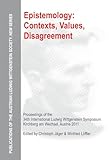Epistemology: Contexts, Values, Disagreement : Proceedings of the 34th International Ludwig Wittgenstein Symposium in Kirchberg, 2011 / ed. by Christoph Jäger, Winfried Löffler.
Material type: TextSeries: Publications of the Austrian Ludwig Wittgenstein Society – New Series ; 19Publisher: Berlin ; Boston : De Gruyter, [2013]Copyright date: ©2007Description: 1 online resource (534 p.)Content type:
TextSeries: Publications of the Austrian Ludwig Wittgenstein Society – New Series ; 19Publisher: Berlin ; Boston : De Gruyter, [2013]Copyright date: ©2007Description: 1 online resource (534 p.)Content type: - 9783110328646
- 9783110329018
- BD161 .I58 2012
- online - DeGruyter
- Issued also in print.
| Item type | Current library | Call number | URL | Status | Notes | Barcode | |
|---|---|---|---|---|---|---|---|
 eBook
eBook
|
Biblioteca "Angelicum" Pont. Univ. S.Tommaso d'Aquino Nuvola online | online - DeGruyter (Browse shelf(Opens below)) | Online access | Not for loan (Accesso limitato) | Accesso per gli utenti autorizzati / Access for authorized users | (dgr)9783110329018 |
Frontmatter -- Contents -- Preface -- I. Contextualism and Invariantism -- Knowledge, Contextualism, and Moorean Paradox -- Context-Sensitivity without Indexicality? -- Non-Relativist Contextualism about Knowledge -- Knowing about Other Contexts -- Epistemic Variantism and the Factivity of Knowledge -- Explaining Variation in Knowledge by Full Belief -- The Contextualist Promise -- II. Epistemic Virtues -- Intellectual Virtues and Their Place in Philosophy -- Understanding’s Tethers -- Knowledge as Achievement and the Value Problem -- Apriority and Virtue: How Successful a Relationship? -- III. The Nature and Value of Knowledge -- Epistemology without the Concept of Knowledge -- Reliabilism as Explicating Knowledge: A Sketch of an Account -- How to Take Truth as a Goal? -- Knowledge as Achievement – Greco’s Double Mistake -- IV. Testimony -- Norms of Trust, De Re Trust, and the Epistemology of Testimony -- Jennifer Lackey on Non-Reductionism: A Critique -- V. Disagreement -- “A Troubled Area”. Understanding the Controversy over Screening Mammography for Women Aged 40-49 -- Is Philosophical Knowledge Possible? -- The Significance of Disagreement in Epistemology -- The Role of the Uniqueness Thesis in the Epistemology of Disagreement -- Counterfactual-Peer Disagreement -- Meta-Induction and the Problem of Fundamental Disagreement -- Rival Logics, Disagreement and Reflective Equilibrium -- VI. Wittgenstein -- The Builders -- First Person Authority without Glamorous Self-Knowledge -- Subjective and Objective Certainty as Regards Knowledge and Action -- Zu einigen Bemerkungen Wittgensteins über die Seele -- Conjecture, Proof, and Sense in Wittgenstein’s Philosophy of Mathematics -- Through Pictures to Problems: Cognitive Epistemology and Therapeutic Philosophy -- Werte und Vernunft in Wittgensteins Spätwerk -- Wittgenstein über Gedankenexperimente -- Wittgenstein, Ethics and Therapy
restricted access online access with authorization star
http://purl.org/coar/access_right/c_16ec
This volume collects papers that were presented at the 34th International Ludwig Wittgenstein Symposium 2011 in Kirchberg am Wechsel, Austria. They focus on five key debates in contemporary epistemology: Does the term “to know” vary its meaning according to features of the contexts in which it is uttered? What role may “epistemic virtues” play in our cognitive activities? What is the surplus value of having knowledge instead of mere true belief? What is the structure and significance of testimonial knowledge and belief? And when is disagreement rational, especially if it occurs among “epistemic peers”? In addition, a section is devoted to novel discussions of the work of Wittgenstein. Papers by A. Beckermann, E. Brendel, W. Davis, C. Elgin, S. Goldberg, J. Greco, A. Kemmerling, H. Kornblith, M. Solomon, M. Williams, and many others.
Issued also in print.
Mode of access: Internet via World Wide Web.
In English.
Description based on online resource; title from PDF title page (publisher's Web site, viewed 28. Feb 2023)


